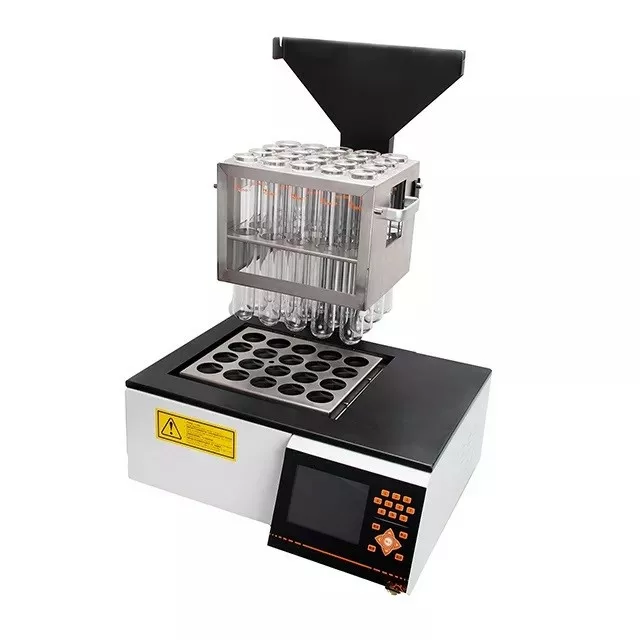Kjeldahl Digester: The Gold Standard in Nitrogen and Protein Analysis
The Kjeldahl Digester KKD/A/20 is an essential instrument in laboratories for determining nitrogen and protein content in various samples, making it crucial for industries such as food and beverage, agriculture, pharmaceuticals, and environmental testing. This equipment uses the Kjeldahl method, a widely recognized and reliable process for nitrogen analysis, ensuring accurate results for protein determination. With advanced technology and automation, modern Kjeldahl digesters offer efficiency, precision, and safety, simplifying complex workflows in any lab setting.
What is a Kjeldahl Digester?
A Kjeldahl Digester is a laboratory apparatus used to digest organic material, transforming nitrogen into ammonium sulfate through heating with concentrated sulfuric acid. This method is an integral part of the Kjeldahl analysis process, which measures the nitrogen content in organic substances like food, soil, and chemicals. This step is followed by distillation and titration to determine the nitrogen concentration, which correlates to the protein content in samples.
Key Features of the Kjeldahl Digester KKD/A/20
- High-Temperature Precision: Kjeldahl digesters provide uniform heating, ensuring consistent digestion and accurate results across multiple samples.
- Multiple Sample Capacity: Advanced models can handle multiple samples simultaneously, making them ideal for high-throughput laboratories.
- Automated Operation: Modern digesters offer automated temperature control and safety features, reducing manual intervention and increasing efficiency.
- Safety Features: Equipped with acid-resistant materials and fume control systems, these digesters ensure safe handling of corrosive chemicals during the digestion process.
- Energy-Efficient Heating Systems: Many digesters feature energy-efficient infrared or block heating, minimizing energy consumption while maintaining rapid heating times.
- Durable Construction: Built from high-quality, corrosion-resistant materials, Kjeldahl digesters are designed to withstand harsh laboratory environments and offer long-lasting performance.
- User-Friendly Interface: With intuitive controls and programmable settings, these devices allow for easy setup and operation, even for complex digestion protocols.
Applications of the Kjeldahl Digester
The Kjeldahl Digester is employed in various industries for nitrogen and protein analysis, including:
- Food and Beverage: Kjeldahl digesters are extensively used for protein content analysis in food products, ensuring compliance with nutritional labeling requirements.
- Agriculture: Used for determining nitrogen levels in soil and fertilizers, the Kjeldahl method helps optimize agricultural productivity and sustainable farming practices.
- Pharmaceuticals: In the pharmaceutical industry, nitrogen analysis is essential for ensuring the quality and consistency of medicinal compounds.
- Environmental Testing: Environmental labs use Kjeldahl digesters for analyzing nitrogen content in wastewater, soil, and other organic materials, helping monitor pollution levels and ensure regulatory compliance.
- Chemical Manufacturing: Kjeldahl analysis is vital in the chemical industry for determining the nitrogen content of raw materials and finished products.
Benefits of Using a Kjeldahl Digester KKD/A/20
Adopting a Kjeldahl Digester in your laboratory offers a host of benefits:
- Accuracy: The Kjeldahl method is renowned for its precision in nitrogen determination, making it the preferred choice for protein analysis.
- Efficiency: Automated models streamline the digestion process, saving time and increasing sample throughput without compromising accuracy.
- Safety: Advanced safety features such as fume extraction and acid resistance reduce the risk of accidents when working with hazardous chemicals.
- Cost-Effective: Modern Kjeldahl digesters are energy-efficient, helping reduce operational costs while maintaining high-performance standards.
- High Reproducibility: With precise temperature control and automated settings, Kjeldahl digesters offer consistent results, making them ideal for quality control and research applications.
Why Choose a Kjeldahl Digester for Nitrogen Analysis?
When it comes to nitrogen and protein analysis, the Kjeldahl Digester remains an industry standard for several reasons:
- Proven Reliability: The Kjeldahl method has been in use for over a century and is still considered one of the most accurate methods for determining nitrogen content.
- Versatility: This instrument is versatile, handling various sample types, from food and beverages to soil and chemicals, making it a valuable tool across many industries.
- Automation: With automated models, laboratories can achieve higher efficiency and accuracy, reducing the likelihood of human error and speeding up workflow.
- Safe and Durable: Advanced safety features protect lab personnel from harmful fumes and corrosive chemicals, while robust construction ensures long-term durability.
How to Choose the Right Kjeldahl Digester for Your Lab
Selecting the ideal Kjeldahl Digester depends on your specific laboratory needs. Key factors to consider include:
- Sample Throughput: If your lab handles large volumes of samples, opt for a model that supports multiple simultaneous digestions.
- Automation Level: Consider an automated or semi-automated model to reduce manual handling and increase operational efficiency.
- Safety Features: Ensure the digester has integrated safety controls such as fume extraction and temperature regulation to protect users.
- Energy Efficiency: Choose a model with energy-efficient heating elements to lower operational costs and minimize environmental impact.
- User-Friendly Interface: Look for systems with easy-to-use controls and programmable settings to simplify complex digestion protocols.
Industries That Benefit from Kjeldahl Digesters
Kjeldahl Digesters serve multiple sectors, offering reliable nitrogen and protein analysis for applications such as:
- Food and Beverage: Protein analysis is critical in ensuring accurate nutritional labeling and quality control for products like meat, dairy, grains, and processed foods.
- Agriculture: By measuring nitrogen content in soil and fertilizers, digesters help farmers and agronomists manage nutrients and improve crop yields.
- Pharmaceutical Industry: Accurate nitrogen analysis ensures the quality and safety of pharmaceuticals, supporting drug development and production.
- Environmental Monitoring: Environmental labs rely on Kjeldahl digesters to analyze nitrogen in soil, water, and waste samples, ensuring compliance with environmental regulations.
Conclusion
A Kjeldahl Digester is an indispensable tool for laboratories requiring accurate and efficient nitrogen and protein analysis. Whether you’re working in the food industry, environmental testing, or pharmaceuticals, the Kjeldahl method offers unparalleled reliability. Modern digesters bring automation, safety, and energy efficiency to the process, enabling labs to handle large sample volumes with precision and consistency.





Reviews
There are no reviews yet.